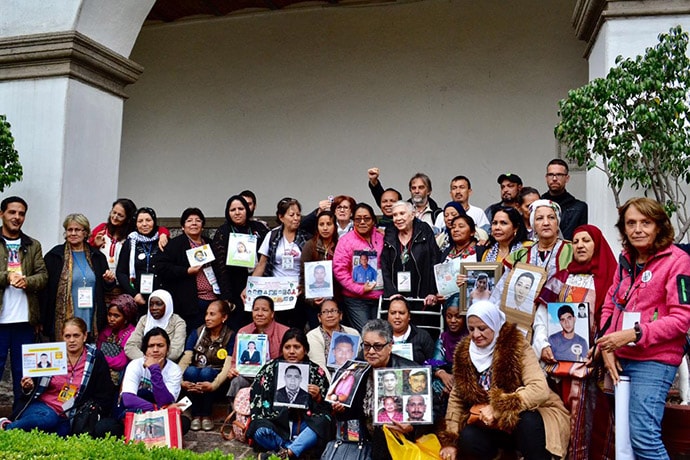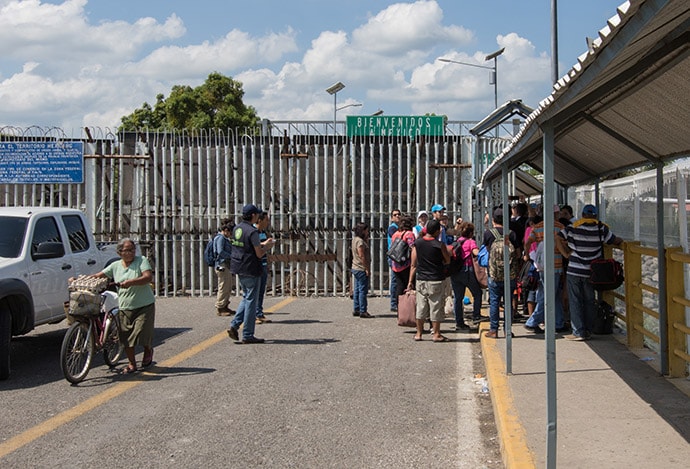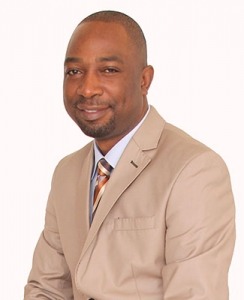Welcome to the October 2018 issue of the Global Washington newsletter.
IN THIS ISSUE
Letter from our Executive Director
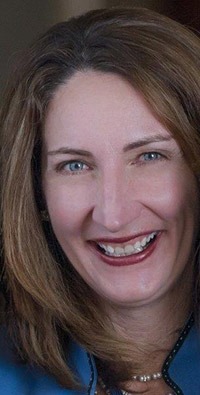
In a recent poll of 13,000 people in 164 countries commissioned by the Rockefeller Foundation, respondents were most optimistic about the global goal of “Achieving Zero Hunger” and said it was the most solvable. However, a new report from the Intergovernmental Panel on Climate Change this month warns that we can expect to see major changes in global weather patterns, sea level, natural ecosystems and food production over the next decade and beyond.
In this week’s newsletter we dive into the consequences of climate change on food security in developing nations, and explore promising mitigation and adaptation strategies, including an approach to regenerate “underground forests” across Africa and Asia, pioneered by a changemaker at World Vision. We also profile how CARE USA aims to increase food security by empowering women to gain greater access to land, capital and agricultural inputs.
Earlier this week we hosted a panel event on this topic with leaders from Landesa, CARE USA, and World Vision USA. If you weren’t able to join us, you can read the recap on our blog.
At our annual conference in December, we will be revisiting this and all of the issues that we have been discussing throughout the year. Steve Davis, CEO of PATH, is our most recently added speaker. You won’t want to miss out!

Kristen Dailey
Executive Director
Back to Top
Issue Brief
How Human-Caused Climate Change Affects Global Food Security
By Joanne Lu
After decades of progress, the United Nations recently reported that global hunger and acute food insecurity are on the rise for the third year in a row. Hunger levels have returned to similar levels as 10 years ago. In addition to persistent conflict and economic downturns, the UN cited the effects of climate change as a leading driver of food insecurity.
Food security, according to the World Food Programme, is when people have “availability and adequate access at all times to sufficient, safe, nutritious food to maintain a healthy and active life.” Rising temperatures, changes in rainfall patterns and an increase in the frequency and severity of disasters is threatening food supply and access, especially for the world’s most vulnerable – many of whom rely on agriculture for their livelihoods. The UN report says that since the early 1990s, extreme climate events, including heat waves, droughts, floods and storms, have doubled, averaging 213 such events every year from 1990 to 2016.
According to another report issued this month by the United Nations Intergovernmental Panel on Climate Change (IPCC), unless human-caused carbon emissions are reduced rapidly in the next twelve years, by 2030 the world can expect to see a dramatic increase in widespread and severe droughts, famines, storms and flooding, disease spread, and species die-offs.
Even in the absence of extreme events, climate patterns are already changing and undermining food security, production and nutrition. The hottest days are hotter than ever and they are happening more frequently.
Warming has a direct impact on crop yield, because it speeds up the population growth and metabolic rates of pests that consume three staple crops: rice, maize and wheat. A recent published study by scientists, including several from the University of Washington, projects that for every degree Celsius that average global temperatures rise, crop yield losses to insects will increase by 10 to 25 percent. Temperate regions, including large swaths of North America and Eurasia, will be hardest hit, they say.
In addition to rising temperatures, rainy seasons are also becoming less intense, with fewer days of rainfall and “abnormally low total accumulated rainfall,” the UN report says, causing droughts, particularly in Africa, Central America, and Southeast Asia.
Droughts, more than any of the other natural hazards, has the biggest impact on food production. According to the UN report, it is responsible for more than 80 percent of the total damage and losses in agriculture, mostly in crop and livestock sectors.
Not only have these events caused shortages in food production, they’ve also caused price spikes that coincide with income losses in agricultural communities. This has made it even harder for those who are most food insecure – particularly the urban poor – to feed themselves and their families. Additionally, changes in climate are damaging food nutrient quality, as well as increasing the risk of food and water contamination that can lead to disease.
As the world population continues to increase, climate researchers and innovators have been turning their attention to transforming the global food system. The new focus on sustainable food systems was evident at the Global Climate Action Summit in September, where several organizations announced major funding commitments. The Global Environment Facility launched a $500 million initiative focused on food systems, the single largest program in the organization’s history.
Also at the Global Climate Action Summit, the Rockefeller Institute and the Innovation Institute for Food and Health at the University of California, Davis announced a new initiative called FoodShot Global, which will provide up to $30 million dollars a year in debt or equity funds to global food innovations. Initially, it will focus on soil health, which research has shown could be the key to mitigating the effects of climate change on food production.
“The long-term sustainability of agricultural systems strongly depends on how we use soil,” Michigan State University Foundation Professor Bruno Basso said in a press release about his new study. “Ultimately, soil is the ‘home’ of the plants. If we aren’t caring for the soil, plants and crops are unsheltered and left to deal with climate change on their own.”
Better soil management also means better food security for the 94 percent of smallholder farmers who provide 70 percent of the world’s food supply. Many of these farmers are in low-income countries that bear the brunt of the effects of climate change, which is largely driven by wealthy countries.
Over the next decade, concerted efforts like these to create a sustainable global food system will be critical to meeting the Paris Agreement to limit the global temperature rise to well below 2 degrees Celsius above pre-industrial levels (or 1.5 degrees, if possible) by 2030. That’s because agriculture and livestock are responsible for about a third of global greenhouse gas emissions. Beef cattle, especially, are the largest source of agricultural emissions. According to scientists, hitting the targets could be the difference between manageable and dangerous levels of warming.
Innovative solutions that arise from partnerships and increased funding will also help ensure the world’s growing population is food secure, even amid the dangers of climate change. The U.S. Department of Agriculture is optimistic. It recently projected, based on economic and population growth, that the number of food insecure people in 76 low- and middle-income countries will drop from 782 million to 446 million over the next 10 years. It also estimated that the share of the population that is food insecure in those countries will drop from 21 percent to 10 percent; not to mention, the intensity of food insecurity will decrease by 34 percent.
In order to achieve – or perhaps exceed – those projections, however, communities must increase their resilience to climate change and food systems must become more sustainable and inclusive.
* * *
The following Global Washington members are working to improve food security for vulnerable populations around the world.
CARE
Founded in 1945 with the creation of the CARE Package®, CARE is a leading humanitarian organization fighting global poverty. CARE places special focus on working alongside women and girls because, equipped with the proper resources, they have the power to lift whole families and entire communities out of poverty. That’s why women and girls are at the heart of CARE’s community-based efforts to improve education and health, create economic opportunity, respond to emergencies and confront hunger. In 2017 CARE worked in 93 countries and reached 63 million people around the world. care.org
FAIR TRADE USA
Fair Trade USA is a nonprofit organization that promotes sustainable livelihoods for farmers and workers, protects fragile ecosystems, and builds strong, transparent supply chains through independent, third-party certification. Its trusted Fair Trade Certified™ seal signifies that rigorous standards have been met in the production, trade and promotion of Fair Trade products from over 50 countries across the globe. fairtradecertified.org
LANDESA
Landesa champions and works to secure land rights for millions of the world’s poorest communities, primarily rural women and men to promote social justice and provide opportunity. Land rights, for example, are an important tool to encourage long-term investments and adoption of sustainable practices that conserve soil and water, supporting long- and short-term food security, essential to these vulnerable communities. For more than 50 years, working in more than 50 countries, Landesa has helped strengthen land rights for more than 125 million families. landesa.org
MERCY CORPS
Mercy Corps is a leading global organization powered by the belief that a better world is possible. In disaster, in hardship, in more than 40 countries around the world, Mercy Corps partners to put bold solutions into action—helping people triumph over adversity and build stronger communities from within. The organization helps people in the midst of humanitarian crisis meet their most urgent food needs and also works to build long-term food security, partnering with the most vulnerable communities to develop comprehensive, integrated programs driven by local needs and market conditions. Last year, Mercy Corps provided urgently needed food to more than 1.5 million people in some of the most hard-to-reach areas of the world. Beyond meeting urgent hunger needs, the organization improves access to sustainable sources of affordable and nutritious food, encourages farmers to produce nutritious crops and healthy livestock, and provides nutrition education to promote healthy and diverse diets. Every year, Mercy Corps connects nearly 1 million farmers to the resources they need to increase production, feed their families and boost incomes. mercycorps.org.
OXFAM AMERICA
Oxfam is a global organization working to right the wrongs of poverty, hunger, and social injustice. Globally, Oxfam works with 22.1 million people in more than 90 countries to create lasting solutions to the injustice of poverty and hunger. Oxfam America is one of 19 members of the international Oxfam confederation. Its vision is to create just, inclusive, and resilient food systems that sustain the planet and provide healthy food for all. Oxfam focuses on empowering and protecting the rights of women and youth who produce, process, and distribute food here in the U.S. and globally. It supports farmers, entrepreneurs, and workers to increase their income, protect their rights, and achieve food security. The organization engages with the top food and beverage companies, supermarkets, and traders through campaigns or direct engagement to foster an inclusive, equitable, and resilient food value chain. Oxfam also works with governments and international financial institutions to shape the right policies and practices to promote a more equitable world. oxfamamerica.org
RESONANCE (FORMERLY SSG ADVISORS)
Resonance is a global team of international development and impact investment professionals that harnesses the power of collaboration to enable communities, companies and governments to drive market-based solutions to global challenges. resonanceglobal.com
TFT
In collaboration with companies, communities, farmers in Africa, Asia and Latin America, TFT works to protect and enhance food security through initiatives and projects focused on farmer livelihoods, healthy soils, protection of natural ecosystems, and responsible plantation development. TFT’s Rurality smallholder program encourages better farming practices and crop diversification with the goals of ensuring that farmer households have stable livelihoods and stable access to a variety of food crops for their own consumption. At the corporate boardroom-level, TFT engages with company leaders to establish values-driven responsible sourcing policies, map their supply chains, and support farmers on issues such as food security for their regions. The organization also develops trainings and contributes to methods that promote local food security needs through the Centre of Social Excellence (CSE) training initiative. tft-earth.org
WORLD VISION
World Vision is a Christian humanitarian organization dedicated to working with children, families, and their communities worldwide to reach their full potential by tackling the root causes of poverty and injustice. One of World Vision’s largest partners is the UN World Food Program (WFP). World Vision partners with WFP in 63 projects in 18 countries to support immediate food security needs of vulnerable populations through food, cash, and voucher assistance as well as mid-term needs through nutrition monitoring and agricultural support. worldvision.org
Back to Top
Organization Profile
CARE
By Arielle Dreher
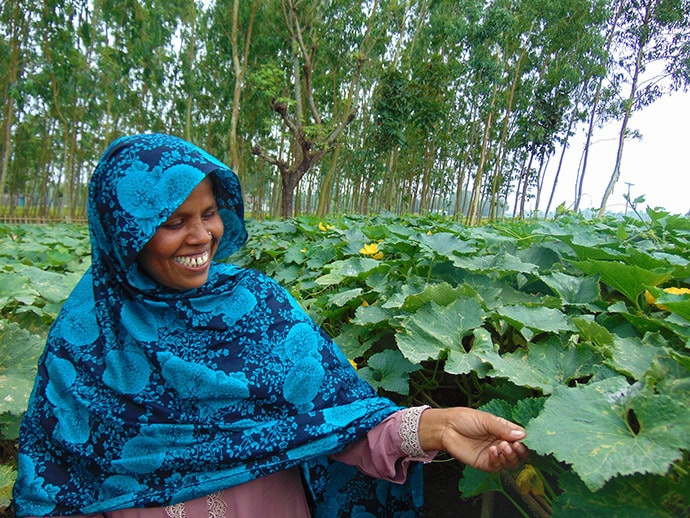
Rabeya, 31, is a mother of two and successful potato and pumpkin farmer. Before she used to grow rice, but her crops became damaged by increasingly frequent floods. “The floods used to come only once a year, now they come twice a year and we don’t know when they will come,” Rabeya says. Rabeya is part of a project set up by CARE to help vulnerable women prepare for the recurring and escalating climate disasters in her area. Women learn about flood tolerant crops and alternatives to rice, which is vulnerable to flooding. Rabeya is now growing potatoes and pumpkins for a profit. (Photo: Vivvi Erkkila/Care).
World hunger is on the rise again, despite quantifiable efforts in the last decade to stem the increase of undernourished people worldwide. The Food and Agriculture Organization of the United Nations estimates that nearly 821 million people face chronic food deprivation today.
In Africa and South America specifically, hunger and food insecurity is getting worse, UN statistics show, due to conflicts, changing weather and economies slowing down, a recent UN report says. When people cannot access food, the chances of malnutrition heighten, too, compounding the problem. If this trajectory is not reversed, the world will not meet the UN Sustainable Development Goal of eradicating hunger by 2030.
CARE, a global nonprofit organization, is working to stop hunger worldwide and reverse the rising tide of food insecurity. CARE works in 94 countries around the world in not only food security but also health, education and disaster relief.
Like most global humanitarian agencies, CARE employs predominantly local people to implement programs and initiatives where it works, predominantly in the global south, in west and east Africa, southeast Asia, and parts of central and South America. Country offices range in size depending on need, and focus on ways to systemically eliminate food insecurity and malnutrition, sometimes by influencing a country’s policies, other times by working directly with community organization on the ground.
While the majority of CARE’s work is done in the global south, it also employs staff in Europe and North America to fundraise and advocate for advancing women’s empowerment and fighting hunger globally.
Women at the Center
CARE’s model of intervention revolves around empowering women, specifically ensuring they have access to and control over the resources necessary to improve their lives and those of their families, according to Juan Echanove, senior director of food and nutrition security at CARE USA.
Twenty years ago in Niger, CARE started a program that helped women take control of their finances and products. The organization helped establish a village savings and loan association that enabled women to share money and invest amongst themselves. Today, 20 million women across the world are a part of these types of associations.
“They’re not only allowing women to have savings, but more importantly they create a safe space for them to meet and gather, which triggers other processes,” Echanove said. “We are talking about contexts where women very often don’t have the possibility to undertake their own economic activities, so they lend from each other with the support from CARE. This is having an impact at the community level in many parts of the world.”
In Bangladesh, CARE started a program called “Nutrition at the Center” to help local women share information and ideally change attitudes towards nutrition and health outcomes for pregnant women and young mothers in rural areas. CARE also helps women access the resources—like land and finances—to grow food around the world.
Worldwide, women make up about half of all farm laborers, but they often cannot access the resources to financially benefit from or grow their own crops. CARE works to increase equality for women in societies by initiating gender dialogues in communities to engage leaders to increase women’s empowerment.
“We have realized, based on several programs we’re developing and research by many others, that by empowering women, we can really (start to see) a more fair and just society, where there is more wealth for everyone,” Echanove says.
Addressing Climate Change
In recent years, CARE’s work has had to address how climate change is affecting farmers and food production all over the global south. There is a strong link between food security and climate change, and the changing climate is at least partly to blame for the forecasted growth in hunger worldwide. Changing weather patterns are affecting food viability in places like Africa, Echanove said, and when farmers struggle to grow the food that’s needed, prices skyrocket.
“You can have the food, but if no one can pay for it then you’re in trouble,” Echanove said.
In already poor communities, climate change can literally translate to starvation for some people. CARE is working to help countries adapt to climate change by creating community-based adaptation plans, helping farmers prepare for less water by introducing water-smart agricultural techniques to help them conserve and use less water while farming. CARE’s other work to tackle climate change involves educating governments and partners in the global north.
“This climate change is so unfair. We cause it – we America, Japan, Europe, China – we are polluting the world and causing this, but this is felt equally across the world,” Echanove said. “… They are getting less crops because of something we are doing, so this is a powerful message that we need to share.”
Beyond lowering emissions, farmers in the global south could use financial support from the global north.
Looking Ahead
While the organization already works in improving the food security and nutrition of 20 million people worldwide, CARE leaders set an ambitious goal to more than double the annual reach to 50 million people by 2020. To get there, Echanove said the nonprofit will need to extend its impact in the countries it works in, as well as expand its fundraising and partnership efforts.
CARE is also spreading the conversation of climate change and how it impacts farming and hunger across the globe. CARE recently brought together farmers from the U.S. South to meet with farmers in Cote d’Ivoire (Ivory Coast) to exchange ideas and techniques they use in small-scale farming. The problems, Echanove said, were the same.
“We are exploring further what we can do to share more. We believe that some of the tools we are promoting in Africa and other parts of the world can be useful for the people working to promote food justice in the U.S.,” he said.
The nonprofit relies on funding from the global north to help programmatic and strategic efforts all around the world. CARE receives funding from donors as well as governments, including the U.S. government. When projecting where the organization will be in 10 years’ time, Echanove said a lot will depend on investment from the global north.
“Investing in development is investing in our global joint future,” Echanove said. “…A lot will depend on what we will do as citizens in terms of getting to a better place in 10 years from now—or not a very nice place.”
Back to Top
Changemaker
Tony Rinaudo, Natural Resources Advisor for World Vision Australia
By Allegra Abramo
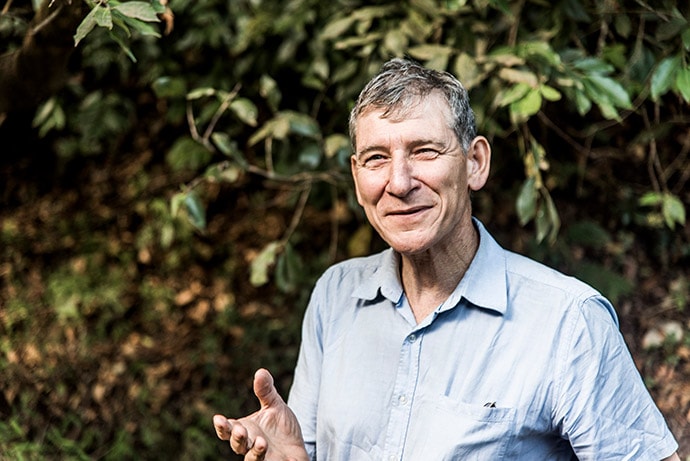
Tony Rinaudo, Natural Resources Advisor for World Vision Australia. (Photo: Silas Kosh/World Vision).
Tony Rinaudo had been planting trees in Niger for more than two years, only to watch most of the saplings wither and die or be chopped down. That failure weighed on the gung-ho young Australian, who had come to Africa in the early 80s on a mission to reduce drought and famine through reforestation.
“I could have easily given up at that time, because I wanted to get on with my life,” Rinaudo said of that period nearly 35 years ago. “It just seemed a waste of time and money.” Instead, Rinaudo sent up a prayer, “Lord, show me what to do.”
What Rinaudo calls his “revelation” came not long after, when he was driving a truck laden with trees across the barren landscape. He had stopped to let some air out of the tires to improve traction in the sandy soil, and his eye was drawn to bushes scattered across the desert. He walked over to one and recognized the distinctive, camel-hoofed shape of the leaves. It wasn’t a bush at all. It was a common tree across Sub-Saharan Africa called Piliostigma reticulatum, or Kalgo in the local Hausa language.
“It was a light bulb moment,” Rinaudo said. The few large trees on the landscape were the same as those bushes, and those bushes were everywhere. “We don’t have to coerce, cajole, force people to plant trees,” he realized. “We just have to convince them that it’s in their best interest to leave a few of these.”
Since that moment, Rinaudo’s mission has been to train, support, and encourage farmers across Africa and Asia to regenerate “underground forests” — the roots, seeds, and stumps that will turn into trees with a little pruning if allowed to grow.
A type of agro-forestry, the practice is known as Farmer-Managed Natural Regeneration, or FMNR. After nearly two decades developing FMNR in Africa, Rinaudo now works to speed its adoption around the globe as a natural resource management advisor for World Vision Australia.
Convincing farmers to leave trees on their fields hasn’t always been an easy sell. The conventional wisdom in Niger held that trees are weeds that compete with crops. In a place where people go hungry most years, trees were seen as a threat, Rinaudo explains.
Those beliefs were quickly challenged once Rinaudo persuaded a handful of farmers to leave a small number of trees on a corner of their land. Not only did their crop yields not suffer, but the soil began to improve due to decomposing leaf litter. Seed germination improved where trees cooled soil temperatures and slowed winds that can reach 40 miles per hour. The trees themselves also provided wild foods, animal fodder, traditional medicines, and small amounts of fuel wood — a precious commodity that women normally must spend hours each day scavenging. Those products could also be sold, providing a valuable source of income.
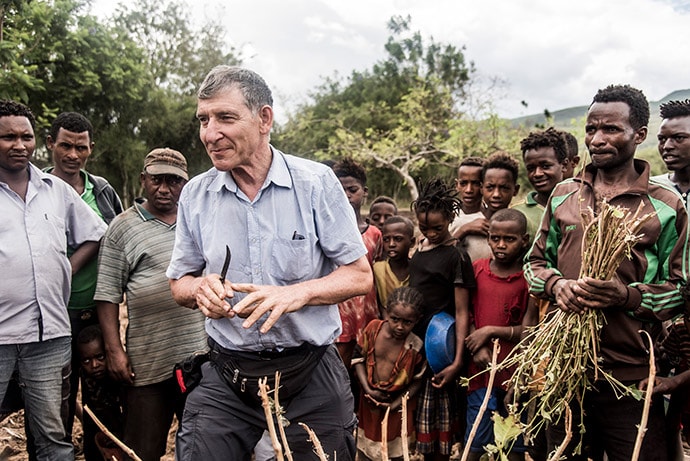
Tony Rinaudo talks with farmers in Humbo, Ethiopia about farmer-managed natural regeneration practices. (Photo: Silas Kosh/World Vision).
“The wonderful thing about FMNR is … farmers are in the driver’s seat,” Rinaudo said. “This is one of the big keys to success. If at any point it threatened their livelihood or their crop, they had the freedom to cut that tree.”
Rinaudo continued to promote FMNR across Niger for 17 years, but the impact of his work became clear only some years after he’d returned to Australia. Satellite mapping in 2005 revealed that areas of forested agricultural land in Niger had grown by about 5 million hectares over 20 years.
Rinaudo doesn’t claim credit for all of that expansion. Some communities already had a tradition of managing trees and farmland together. Niger’s severe drought and famine spurred a rejuvenation of those traditional practices, he says.
Since joining World Vision in 1999, Rinaudo and his team have spearheaded FMNR projects across Africa, as well as Indonesia, Timor Leste, Myanmar and other Asian nations. While large-scale evaluations of FMNR are limited, the program has documented some remarkable results.
In Kenya, for example, dairy farmers have been able to increase milk production by up to 500 percent with the same number of cows, because the animals now have better nutrition. In Ethiopia, two communities have reduced carbon dioxide emissions by an amount equivalent to taking nearly 132,000 cars off the road through the use of FMNR and fuel-efficient stoves. Selling those carbon credits, along with products such a honey and fruit, boosts income in a region with one of the lowest per-capita GDPs in the world.
Increasing tree cover serves as both a mitigation and an adaptation to climate change, Rinaudo says. Not only do trees absorb carbon dioxide, but they also give farmers an important buffer against weather extremes that are expected to worsen as the climate changes. In addition to cooling and enriching the soil, some tree species even draw water from deep in the soil and ‘leak’ it into the soil through shallow roots near the surface, helping crops survive. And if crop fail in any one year, products from the trees still provide a source of income.
“So we are helping people to cope right now,” Rinaudo said, “and we are buying time for when our governments and our industries get their act together and reduce emissions.”
One of the most important benefits of FMNR has little to do with the trees themselves. Many poor, rural people feel forgotten, Rinaudo says. FMNR gives them a measure of self-determination that wasn’t there before. “What really, really counts is the dignity — people get their dignity back,” he said.
Now Rinaudo is determined to see the benefits of FMNR reach many more people around the world. Through World Vision, he recently teamed up with Global Good, a Bill Gates-funded initiative to develop technologies that improve the lives of poor people. The organization sponsored a workshop earlier this year aimed at scaling up FMNR by developing strategies to better market the approach and to remotely monitor and quantify its spread. Rinaudo is also working with other non-governmental organizations in the Global EverGreening Alliance to help African nations adopt FMNR as a way to meet their land-restoration and climate-change commitments.
Rinaudo still travels nearly half of every year to run FMNR workshops, set up new programs, and troubleshoot existing ones. Now, instead of the “mad white farmer,” he’s often greeted as the “chief farmer.”
He’s earned that moniker over decades of building trust with people on the ground, and persevering in the face of their doubts and resistance. “This is an overnight success story that took 30 years,” Rinaudo said.
That long road to success all began with listening to the dream inside him. “In no way did I know when I was young how this would play out,” he said. “But when you take a step on that journey, God — or some might say the forces of the universe — come to your aid. So don’t be scared to follow that dream.”
In recognition of his pioneering work, Rinaudo in September received the Right Livelihood Award, known as the “Alternative Nobel Prize.” Presented annually in Stockholm, the Right Livelihood Award was established in 1980 to “honor and support courageous people and organizations offering visionary and exemplary solutions to the root causes of global problems.”
Back to Top
Welcome New Members
Please welcome our newest Global Washington members. Take a moment to familiarize yourself with their work and consider opportunities for support and collaboration!
CliftonLarsonAllen (CLA)
CLA exists to create opportunities — for its clients, its people, and its communities. It is dedicated to building an inclusive culture that thrives on different beliefs and perspectives. By welcoming and respecting its clients and each other, all can experience success. claconnect.com
Everywoman Treaty
The next step in ending violence against women and girls. Everywoman Treaty is a Global Coalition of over 2200 individuals and organizations from 145 countries working together to develop and call for a global treaty on violence against women and girls. everywoman.org
Hands For Peacemaking Foundation
The focus of the Hands for Peacemaking Foundation is to offer opportunities for economic development, improved health conditions and access to education to promote self-sufficiency for the Guatemalan people. handsforpeacemaking.org
Health Alliance International
Health Alliance International (HAI)’s mission is to promote policies and support programs that strengthen government primary health care and foster social, economic, and health equity for all. Its vision is a just world that promotes health and well-being, including universal access to quality health care. healthallianceinternational.org
Lakeside School
Lakeside School is a private/independent school located in the Haller Lake neighborhood at the north city limits of Seattle, Washington for grades 5–12. Famous alumni include Microsoft founders Bill Gates and Paul Allen. In 2018, school review website Niche ranked Lakeside School the best school in Washington state and the 6th best school in the United States. lakesideschool.org
Back to Top
Member Events
Oct 18: Worldwide Fistula Fund // Night Out for Fistula
Oct 18: Max Foundation // A Taste of Max Foundation
Oct 23: Peace Trees Vietnam // 23rd Anniversary Luncheon
Oct 23: Oikocredit US // Coffee Cupping with Nicaraguan Cooperative Aldea Global
Oct 25: Sahar Education // Build a Dream for an Afghan Girl
Oct 27: Mission Africa // Mission Africa Benefit Luncheon 2018
Back to Top
Career Center
Youth Leadership Development Co-facilitator OneWorld Now!
Global Fellowship Moving Worlds Institute
Inventory & Sales Coordinator Snow Leopard Trust
Relationship Manager The Forest Trust
Check out the GlobalWA Job Board for the latest openings.
Back to Top
GlobalWA Events
October 17: Voices from the Field: Suyheang Kry, Cambodia’s Women Peace Makers
December 6: GlobalWA Annual Conference
Back to Top
